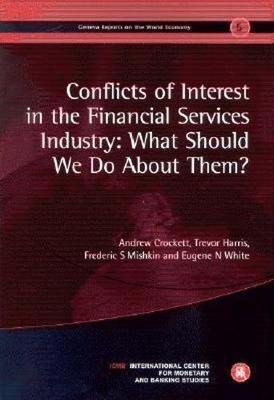The fifth report in this series focuses on conflicts of interest that arise when a firm combines multiple lines of business, creating multiple interests. Conflicts between research and underwriting in investment banking and between auditing and consulting in accounting firms are investigated, as are the problems that arise from rating agencies providing consulting services and from universal banks combining commercial and investment banking. In the recent stock market collapse, confidence in the financial industry was shaken by numerous scandals. Beginning with Enron in 2001, scandals brought about the demise of prominent financial figures, damaged the reputation of premiere firms and destroyed the global accounting giant Arthur Andersen. Central to this crisis was the exploitation of conflicts of interest. Research analysts at investment banks were found to be distorting information at the behest of underwriting departments eager to promote new issues. Auditors appeared to sanction misleading accounting in order to gain business for the consulting side of their firms. Policy response in the United States was quick. Large fines were levied and regulators compelled the separation of financial security function, constraining financial conglomerates. But are these new regulations and safeguards adequate protection? What costs do they impose on the industry? This fifth title in the ICMP/CEPR series of Geneva Reports on the World Economy examines the problem of conflicts of interest in the financial system. Conflicts of interest lead to a decrease in information that makes it harder for the system to provide savers wit the accurate, essential information that induces them to provide credit to borrowers. This study focuses on conflicts of interest that arise when a firm combines multiple lines of business, creating multiple interests. Conflicts between research and underwriting in investment banking and between auditing and consulting in accounting firms are investigated, as are the problems that arise from rating agencies providing consulting services and from universal banks combining commercial and investment banking. Determining the appropriate remedy for a conflict is a challenge because the elimination of conflicts may also eliminate benefits from economies of scope. This study examines five generic remedies: market discipline, regulation for increased transparency, supervisory oversight, separation of financial activities by function, and socialization of the collection and distribution of information. The authors apply this framework to assess critically the Sarbanes-Oxley Act and the Global Settlement between American regulators and investment banks.
- ISBN13 9781898128793
- Publish Date 30 March 2004
- Publish Status Active
- Publish Country GB
- Imprint Centre for Economic Policy Research
- Format Paperback
- Pages 100
- Language English
